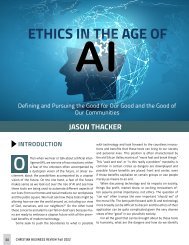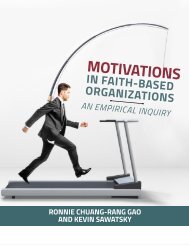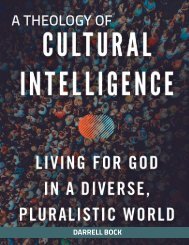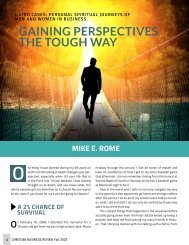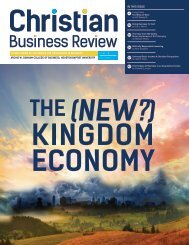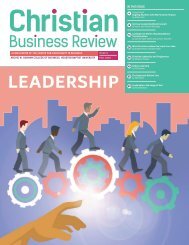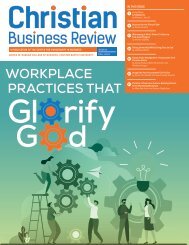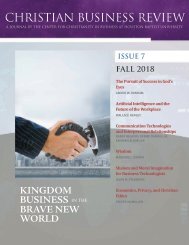Christian Business Review 2022: Pressing On Toward God's Goal
Create successful ePaper yourself
Turn your PDF publications into a flip-book with our unique Google optimized e-Paper software.
ETHICS IN THE AGE OF AI<br />
CBR ARTICLES<br />
and throughout society, the challenges demand a response<br />
from business leaders who play such a vital role in our communities.<br />
AUTOMATION AND WORK<br />
<strong>On</strong>e of the most prevalent ethical issues surrounding artificial<br />
intelligence is how this technology is revolutionizing<br />
the nature of work and how it alters the way we view<br />
others in a society that often speaks of someone’s worth<br />
based on their contribution to society or the greater good.<br />
The AI revolution is often referred to as the “Second Digital<br />
Age” (the advent of computers being the first) or “The Second<br />
Machine Age” (the first being the industrial revolution). 5 In<br />
the past few years, there have been countless apocalyptic<br />
warnings about massive job loss attributable to automation.<br />
Much of that fear and panic has subsided as society begins to<br />
truly see how tools like AI help augment and automate various<br />
aspects of our jobs and how innovations help create new<br />
jobs as well. If we view this current revolution through the<br />
lens of history, we know that it will likely bring about massive<br />
shifts in our society in terms of the nature of work. It may also<br />
precipitate an explosion in wealth and prosperity for more<br />
of human society than ever before. 6<br />
Automation and AI are transforming industries across our<br />
society, from transportation, manufacturing to medicine and<br />
even journalism. Take for example the transportation sector.<br />
According to the American Trucking Association, there were<br />
approximately 3.36 million truck drivers in America in 2020<br />
with 7.65 million people employed throughout the economy<br />
in jobs related to trucking, excluding the self-employed. 7 If<br />
we add in the number of professional drivers who work in<br />
shipping/logistics, food delivery, transportation, and other<br />
transportation related work, then that number quickly rises<br />
to above 13.3 million workers in the transportation sector<br />
as a whole. 8 If autonomous vehicles were to be deployed<br />
throughout society, communities all over will experience<br />
massive socioeconomic breakdown if these workers weren’t<br />
able to transition careers or keep their current jobs in the industry.<br />
This breakdown will affect not only the drivers themselves,<br />
but also their families and the wider communities<br />
they live in.<br />
Studies have shown that as joblessness increases, substance<br />
abuse and sexual immorality are also prone to rise as<br />
people try to deal with the psychological effects of job losses.<br />
9 And this is just one segment of our society. While the potential<br />
social upheaval in our communities is serious, some<br />
argue that there is nothing really to fear because humanity is<br />
adaptable and these types of challenges had happened before.<br />
10 There is an element of truth to this. Some jobs will<br />
be replaced, others augmented, and many new jobs will be<br />
created. The future of work is a very complex ethical question.<br />
However, at the core of the debate must be the meaning<br />
of work itself and how God created us to work as his image<br />
bearers. 11<br />
Some key ethical questions concerning AI and work relate<br />
to how we can uphold the dignity and value of work in an<br />
age of increasing automation and digitization. 12 How do we<br />
care for those in our workplaces who are negatively affected<br />
by emerging technologies like AI? How do these technologies<br />
affect the way we view the value of our neighbors in a<br />
society that routinely sees someone’s dignity as a function<br />
of their contribution to society? Is our work simply a means<br />
to provide for ourselves and our families or is there a deeper<br />
meaning to our work? 13 Do we look at a jobless future as<br />
one of pure leisure? Should the government provide for those<br />
who lose their jobs due to automation and in what ways?<br />
How should we harness these (AI) tools in our work? Do business<br />
leaders have a responsibility to care for people even if<br />
that means sacrificing profits or performing services in a less<br />
than efficient manner?<br />
Some of the big questions arising from the fallout of the<br />
Covid-19 pandemic and the resulting loss of millions of jobs<br />
may be a microcosm of what we may face moving forward<br />
in the age of AI. Perhaps the experience can help put these<br />
issues in the right perspective: that we are infinitely worthy<br />
because we are all created in the image of God.<br />
PRIVACY AND HUMAN<br />
DIGNITY<br />
<strong>On</strong>e of the challenges in business is how best to reach<br />
more and more people with the services or products<br />
we offer. Often in an overcrowded market (and social media<br />
space), we hear about the ways that digital marketing can<br />
revolutionize business if only data can be better harnessed<br />
to address the needs of customers or target potential customers<br />
in cyberspace. While marketing itself is not immoral,<br />
there are temptations that business leaders face today<br />
concerning data related to customers and employees alike. 14<br />
52<br />
CHRISTIAN BUSINESS REVIEW Fall <strong>2022</strong>




